Ukraine

“Through International Orthodox Christian Charities’ Romania partner Federation Filantropia, IOCC support has stocked a warehouse in Moldova, where our local partner Diakonie is distributing basics to refugees arriving from Ukraine.”
Please continue to give to IOCC’s Ukraine Relief Fund: https://support.iocc.org/site/Donation2?df_id=7543&mfc_pref=T&7543.donation=form x
And here is why:
Prepare yourself for some discomforting picures.
Russian Orthodox Church in Donbas, Ukraine, destroyed by Russian shelling (Euromaidan Press)
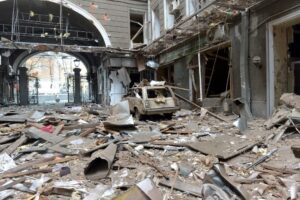
Jewish Hillel chapter house in Kharkiv, destroyed by Russian shelling, March 2, 2022 (Times of Israel)
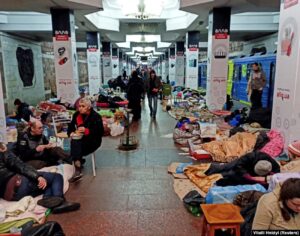
Civilians sheltering in subway station in Kharkiv, March 2, 2022 (Radio Liberty / Radio Free Europe)
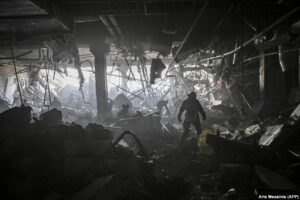
Retroville Shopping Mall, Kyiv, after Russian rocket attack, March 21, 2022 (Radio Liberty / Radio Free Europe)

Natali Sevriukova, next to her apartment house, after a Russian rocket attack, Kyiv, February 25, 2022 (Emilio Morenatti, AP)

Mass graves, Mariupol. Because of continual Russian shelling, there is no opportunity for people to bury their dead individually. (Times of India)
A few of the over four million refugees who have fled Ukraine
Please, every day pray Psalm 31 with and for the people of Ukraine.
Fourth Sunday of Great Lent
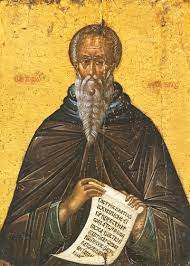 Saint John of the Ladder (John Climacus)
Saint John of the Ladder (John Climacus)
Saint John’s actual feast day is March 30. Sometime before the Thirteenth Century he also became the major commemoration on the Fourth Sunday of Lent.
(All icons, except as noted, with permission of Saint Isaac’s Skete at skete.com)
John was born about 579 in Palestine. When he was 16 he went to the Monastery of Saint Catherine at Mount Sinai – which is still active after all these centuries.
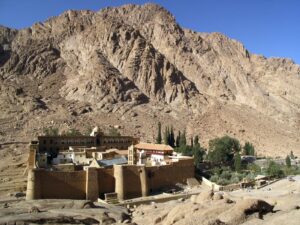
(by Joonas Plaan, Creative Commons Lincense)
After four years of training in the monastic way, he settled five miles from the monastery as a hermit. Some hermits hole up by themselves and eat and sleep little. John was not like that. He ate everything allowed in small amounts and slept some. He welcomed visitors and became a spiritual guide to many. He was an excellent teacher, and he just loved to talk, so much so that he was accused of being a chatterbox! So for a year he kept silent, talked to nobody – and spoke again only after his critics begged him to. He received the gifts of continuous prayer and holy tears.
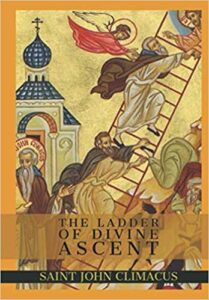 After forty years John was elected abbot of the monastery. There, for his monks, he wrote “The Ladder of Divine Ascent“. Since Saint Catherine’s attracted many pilgrims, his book became popular far beyond the monastery – as it is to this day.
After forty years John was elected abbot of the monastery. There, for his monks, he wrote “The Ladder of Divine Ascent“. Since Saint Catherine’s attracted many pilgrims, his book became popular far beyond the monastery – as it is to this day.
Edition available from Amazon, with a five star rating from reviewers!
It is read at meals during Lent in Orthodox monasteries.
“The Ladder of Divine Ascent” consists of thirty steps towards spiritual perfection, beginning with practical matters like Renunciation and Detachment, leading up to highest: Heaven on earth, The resurrection of the soul before the general resurrection.
It is fairly easy reading. It sounds like John – conversational, almost “chatty”, with many stories and much advice. If you read it, keep in mind that it was written for monks, not people who live out here in “the world”. For our use some of the things he says need to be adapted, toned down a bit.
 Why does the Church honor John Climacus this Sunday? So he can remind us who have embarked on the Christian Way to keep climbing. Whatever you’re doing for Lent, don’t give up now. Most important during life, with the help of God, keep climbing towards Heaven.
Why does the Church honor John Climacus this Sunday? So he can remind us who have embarked on the Christian Way to keep climbing. Whatever you’re doing for Lent, don’t give up now. Most important during life, with the help of God, keep climbing towards Heaven.
You know the danger if you start to climb a ladder, then get half-way up and stop, give up. (Look closely at the icon.) You would have been better off never to have started climbing at all.
When John Climacus was about 70 he resigned as abbot and returned to his hermitage.
Most accounts say he died in peace soon after, though some say he lived on till he was 80.
Epistle for the Fourth Sunday of Lent: Hebrews 6:13-20
Why this particular Sunday Epistle was chosen for us to hear I do not know. The first part of it is confusing, to say the very least. The Letter to the Hebrews was obviously intended for Jews or Jewish Christians. This reading makes a point that they might understand far more easily than we Gentiles do.
According to Old Testament Law, the witness of two men is binding. Hebrews says here that when God promised Abraham that He would bless and multiply him, He swore it by Himself in two ways – that is, by the Father and by the Son. Therefore Jesus Christ is our hope, “a sure and steadfast anchor of the soul.”
Now we come to the part that we can grasp: Jewish high priests entered once a year behind the curtain into the “inner shrine” of the temple in Jerusalem, the Holy of Holies. Jesus 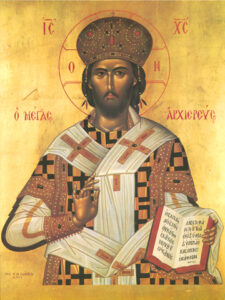 Christ has gone behind the curtain of death, into the true Holy of Holies, “as a forerunner of our behalf” to lead our way through death and into the resurrection. This is why when He died there was an earthquake, and “behold, the veil of the temple was torn in two from top to bottom”. Matthew 27:51 The true and eternal “high priest forever after the order of Melchizedek” had come. The time of the Old Covenant was over.
Christ has gone behind the curtain of death, into the true Holy of Holies, “as a forerunner of our behalf” to lead our way through death and into the resurrection. This is why when He died there was an earthquake, and “behold, the veil of the temple was torn in two from top to bottom”. Matthew 27:51 The true and eternal “high priest forever after the order of Melchizedek” had come. The time of the Old Covenant was over.
Holy Gospel for the Fourth Sunday of Lent: Mark 9:17-30
The Epileptic Boy
Our Lord Jesus was fully Human. The letter to the Hebrews emphasizes that He was like us in all things except sin, that He was subject to human weakness. in this Gospel readingl He certainly shows it. He gets completely frustrated, just as we all do sometimes.
For some while now, Christ had been training His apostles to continue His work after HIs Resurrection and Ascension. Now a man has brought his epileptic son to them to be healed, and the apostles couldn’t do it. So he comes to Jesus: “I asked your disciples to cast it out, and they weren’t able. Can You heal my son?”
And He cries out, “Faithless generation, how long shall I be with you? How long shall I put up with you?” Jesus seems here to “lose it” for a moment: They couldn’t do it! There is so little time left. Passover is coming, and they’re not ready!
(I wonder, by the way, how often He gets frustrated with us in the same way: “They know they have only so many years to live, they don’t know how many, and they’re not ready!”)
“Bring him to Me”, He says. Immediately the boy has a convulsion. Jesus the Good Physician asks a physician’s question: “How long has he had this?” The father describes his boy’s dreadful condition – we can just feel his love for his son 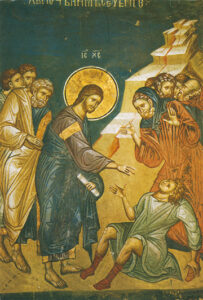 – and concludes, “If you can, have pity on us.”
– and concludes, “If you can, have pity on us.”
Jesus’ answers (again I think I hear His frustration rising): “If You can! If you believe, anything is possible.” The man cries out: “Lord, I believe; help my unbelief.”
That is our condition, isn’t it? and the apostles’ condition. It’s not that we disbelieve. We do believe, we do have faith, we’re here with Our Lord. But we have so little faith. We need so much more. “Lord, we believe. Help our unbelief.”
Jesus rebukes the unclean spirit: “You dumb and deaf spirit, I command you, come out of him, and never enter him again!” With another great convulsion, the demon comes out, and Jesus lifts the boy up. He is well.
I love my daughter and son and son-in-law and my grandchildren so much… I can almost begin to imagine how this father felt.
Later in the house the disciples ask: “Why couldn’t we cast it out?” Jesus, calm now, gives the answer of the spiritual Master, the One who knows the diseases of the soul, knows the demons. “This kind”, He says, “can be driven out only by prayer and fasting.” (So 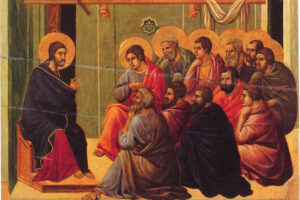 there are different techniques to use on different demons!) The apostles hadn’t prayed enough yet, hadn’t fasted enough, hadn’t sufficiently developed these tools of faith yet. But they would… they would.
there are different techniques to use on different demons!) The apostles hadn’t prayed enough yet, hadn’t fasted enough, hadn’t sufficiently developed these tools of faith yet. But they would… they would.
(Archdiocese of Washington)
During these next three weeks of Great Lent, as we near Holy Week, we also need do concentrate on our praying and fasting, and learning how to be rid of our “demons”.
The Disciples don’t “get it”.
As they traveled on, heading up towards Jerusalem, the Lord told them again – this is His third prophecy of His death and resurrection: “The Son of Man is being delivered into the hands of men, they will kill Him, and on the third day He will rise again.”
In the next verse (why ever is it left out of this Sunday reading?) Mark goes on to add: “They did not understand what this meant, and they were afraid to ask.” Surely He must be speaking in symbols; He so often does. They feared to face the possibility that He was not speaking in symbols.
After His Resurrection, looking back, they remembered how often He had told them what was going to happen, but as of this morning’s  Gospel reading, they just couldn’t bear to hear it yet. They could not imagine that His death would be not defeat but victory, not the end of their hopes but their fulfillment. They didn’t have enough faith yet to face His death.
Gospel reading, they just couldn’t bear to hear it yet. They could not imagine that His death would be not defeat but victory, not the end of their hopes but their fulfillment. They didn’t have enough faith yet to face His death.
But soon He would rise from death, trampling down death by death.
And then see how their faith grew. Look what the apostles built with their faith in Jesus Christ. Look at how they died in faith, without fear, all but one of them martyred. Look at their One Holy Catholic and Apostolic Church, still here twenty centuries later.
Our Deaths
We who follow Jesus Christ, who are members of that same One Holy Catholic and Apostolic Church – do we fear to follow Him into death?
At a certain age in life, our deaths seem very abstract; most of us don’t think about it much. Then comes middle age, when death begins to nag at us – at some, for various reasons, more than others. Then comes my age when my approaching death is an ever-present reality. When I’m not concentrating on something else… there it is always before me.
“On the remembrance of death” is the sixth step in Saint John’s “Ladder“. He wrote: “Someone has said that you cannot pass a day devoutly unless you think of it as your last.”
Really? To our “death-avoiding” culture, that sounds morose, depressing.
What if you knew today were your last day on earth? (After all, one of these days will be your last. You know that.) What would you do with your last hours on earth?
How much time would you spend on trivialities, or worse? How much time would you have to spend making last minute arrangements? making your will? getting financial affairs in order, finding a cemetery plot! (Brothers and sisters, please plan ahead.)
Or on your last day: What would you need to confess to your Lord? (Quick! Find a priest! I need to go to Confession!) How many people would you need to apologize to? or forgive? How many people would you quickly want to tell “I love you”? (Please, do these things now.)
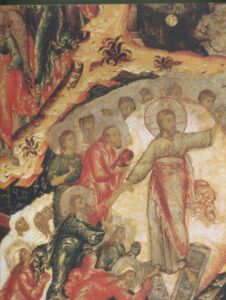 So if you had taken care of all those things before your last day: How much time would you spend with those you love? How much time just looking around, thanking God for the beautiful world He gave you? and thanking Him for His wonderful gift of life? and just “being” with your Lord Jesus Christ? asking Him to be with you and lead the way, as He has every other day of your life – and thanking Him for the even more wonderful and beautiful Life that, by His promise, lies ahead.
So if you had taken care of all those things before your last day: How much time would you spend with those you love? How much time just looking around, thanking God for the beautiful world He gave you? and thanking Him for His wonderful gift of life? and just “being” with your Lord Jesus Christ? asking Him to be with you and lead the way, as He has every other day of your life – and thanking Him for the even more wonderful and beautiful Life that, by His promise, lies ahead.
from a 17th century icon, Russian
(https://iconreader.wordpress.com)
Would that kind of last day be a bad day? Would it be depressing? I don’t think so. I think it would probably be the best day of your life. And how beautiful it would be to live that “last day” now, every day of your life.
“You cannot pass a day devoutly unless you think of it as your last.”
Saint John wrote: “We may be sure that remembrance of death, like every other blessing, is a gift from God. This then is the sixth step. He who has truly climbed it will never sin.”
Next Week: Fifth Week in Great Lent – 1) Saint Mary of Egypt: Repentance, 2) The Apostle begin to catch on (sort of)
Week after next: Palm Sunday and Holy Week
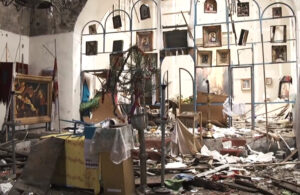
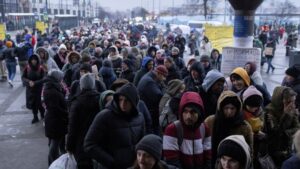

Love you insights and teachings.